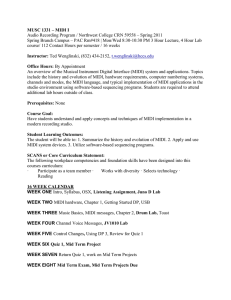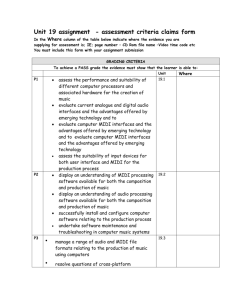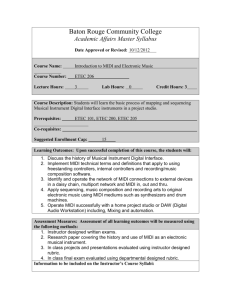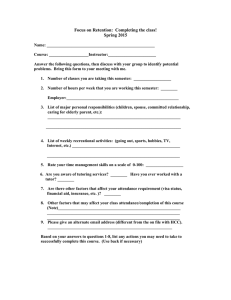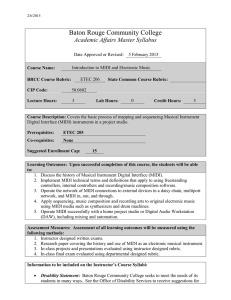Syllabus - MIDI 2 Ted word doc.doc
advertisement
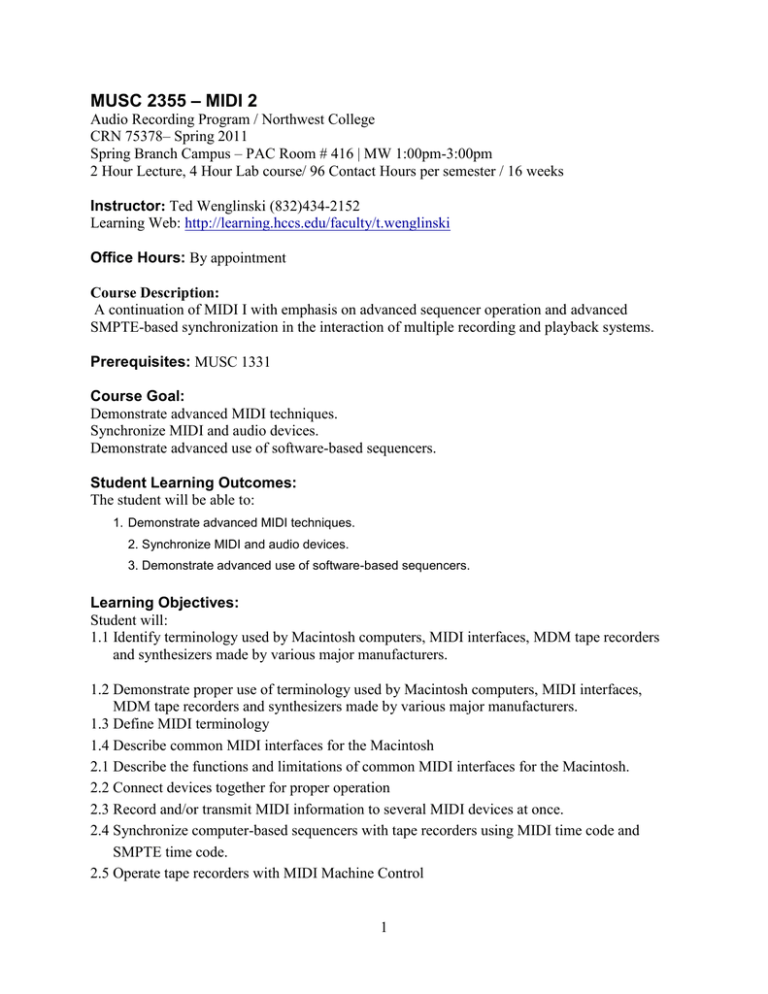
MUSC 2355 – MIDI 2 Audio Recording Program / Northwest College CRN 75378– Spring 2011 Spring Branch Campus – PAC Room # 416 | MW 1:00pm-3:00pm 2 Hour Lecture, 4 Hour Lab course/ 96 Contact Hours per semester / 16 weeks Instructor: Ted Wenglinski (832)434-2152 Learning Web: http://learning.hccs.edu/faculty/t.wenglinski Office Hours: By appointment Course Description: A continuation of MIDI I with emphasis on advanced sequencer operation and advanced SMPTE-based synchronization in the interaction of multiple recording and playback systems. Prerequisites: MUSC 1331 Course Goal: Demonstrate advanced MIDI techniques. Synchronize MIDI and audio devices. Demonstrate advanced use of software-based sequencers. Student Learning Outcomes: The student will be able to: 1. Demonstrate advanced MIDI techniques. 2. Synchronize MIDI and audio devices. 3. Demonstrate advanced use of software-based sequencers. Learning Objectives: Student will: 1.1 Identify terminology used by Macintosh computers, MIDI interfaces, MDM tape recorders and synthesizers made by various major manufacturers. 1.2 Demonstrate proper use of terminology used by Macintosh computers, MIDI interfaces, MDM tape recorders and synthesizers made by various major manufacturers. 1.3 Define MIDI terminology 1.4 Describe common MIDI interfaces for the Macintosh 2.1 Describe the functions and limitations of common MIDI interfaces for the Macintosh. 2.2 Connect devices together for proper operation 2.3 Record and/or transmit MIDI information to several MIDI devices at once. 2.4 Synchronize computer-based sequencers with tape recorders using MIDI time code and SMPTE time code. 2.5 Operate tape recorders with MIDI Machine Control 1 3.1 Describe the system exclusive editing procedures for synthesizers of various major manufacturers. 3.2 Identify the editing functions of a universal editor/librarian such as Unisyn. 3.3 Demonstrate the ability to select a system exclusive editing module for a SCANS or Core Curriculum Statement: The following workplace competencies and foundation skills have been designed into this courses curriculum: • Demonstrate advanced MIDI techniques. • Synchronize MIDI and audio devices. • Demonstrate advanced use of software-based sequencers. 16 WEEK CALENDAR 2 WEEK ONE Intro, Review MIDI 1 concepts, review Mac computers WEEK TWO WEEK THREE WEEK FOUR WEEK FIVE WEEK SIX WEEK SEVEN WEEK EIGHT Mid Term Exam WEEK NINE WEEK TEN WEEK ELEVEN WEEK TWELVE WEEK THIRTEEN WEEK FOURTEEN WEEK FIFTEEN WEEK SIXTEEN Final Exam Instructional Methods: MUSC 2345 is a required course for all audio recording students seeking the Enhanced MIDI Certificate. 3 The class will be comprised of a variety of instructional methods including lectures, class discussions, computer-based lab assignments, and hands-on demonstrations. As a student wanting to learn about the field of audio recording, it is your responsibility to read the textbook, submit assignments in a timely fashion, study for exams, participate in classroom activities, and attend class. Student Assignments: Students will be required to complete the following assignments during the semester: • Projects Much of MIDI 2 will involve projects completed both in class and outside of class. There will be a minimum of 4 projects. • Quizzes There will be 2 quizzes, one each prior to the Midterm Exam and the Final Exam. • Midterm Exam Multiple choice questions based on material covered to date. • Final Exam 1. Written: Multiple choice questions based on all material covered to during the semester. 2. Hands-On: Individual Hands-on demonstration of skills during the semester. Assessments: Attendance Projects: Quizzes Midterm Exam Final Exam 10% 40% 20% 10% 20% Instructional Materials: The MIDI Manual, 3rd Edition David Miles Huber ISBN-13: 978-0-240-80798-0 HCC Policy Statement – ADA Any student with a documented disability (e.g. physical, learning, psychiatric, vision, hearing, etc.) who needs to arrange reasonable accommodations must contact the Disability Services Office at the respective college at the beginning of each semester. Faculty is authorized to provide only the accommodations requested by the Disability Support Services Office. HCC Policy Statement – Academic Honesty 4 A student who is academically dishonest is, by definition, not showing that the coursework has been learned, and that student is claiming an advantage not available to other students. The instructor is responsible for measuring each student's individual achievements and also for ensuring that all students compete on a level playing field. Thus, in our system, the instructor has teaching, grading, and enforcement roles. You are expected to be familiar with the University's Policy on Academic Honesty, found in the catalog. What that means is: If you are charged with an offense, pleading ignorance of the rules will not help you. Students are responsible for conducting themselves with honor and integrity in fulfilling course requirements. Penalties and/or disciplinary proceedings may be initiated by College System officials against a student accused of scholastic dishonesty. “Scholastic dishonesty”: includes, but is not limited to, cheating on a test, plagiarism, and collusion. Cheating on a test includes: Copying from another students’ test paper; Using materials not authorized by the person giving the test; Collaborating with another student during a test without authorization; Knowingly using, buying, selling, stealing, transporting, or soliciting in whole or part the contents of a test that has not been administered; Bribing another person to obtain a test that is to be administered. Plagiarism means the appropriation of another’s work and the unacknowledged incorporation of that work in one’s own written work offered for credit. Collusion mean the unauthorized collaboration with another person in preparing written work offered for credit. Possible punishments for academic dishonesty may include a grade of 0 or F in the particular assignment, failure in the course, and/or recommendation for probation or dismissal from the College System. (See the Student Handbook) Class Attendance Class Attendance - It is important that you come to class! Attending class regularly is the best way to succeed in this class. Research has shown that the single most important factor in student success is attendance. Simply put, going to class greatly increases your ability to succeed. You are expected to attend all lecture and labs regularly. You are responsible for materials covered during your absences. Class attendance is checked daily. Although it is your responsibility to drop a course for nonattendance, the instructor has the authority to drop you for excessive absences. If you are not attending class, you are not learning the information. As the information that is discussed in class is important for your career, students may be dropped from a course after accumulating absences in excess of 12.5% hours of instruction. The six hours of class time would include any total classes missed or for excessive tardiness or leaving class early. 5 You may decide NOT to come to class for whatever reason. As an adult making the decision not to attend, you do not have to notify the instructor prior to missing a class. However, if this happens too many times, you may suddenly find that you have “lost” the class. Poor attendance records tend to correlate with poor grades. If you miss any class, including the first week, you are responsible for all material missed. It is a good idea to find a friend or a buddy in class who would be willing to share class notes or discussion or be able to hand in paper if you unavoidably miss a class. HCC Course Withdrawal Policy If you feel that you cannot complete this course, you will need to withdraw from the course prior to the final date of withdrawal. Before you withdraw from your course; please take the time to meet with the instructor to discuss why you feel it is necessary to do so. The instructor may be able to provide you with suggestions that would enable you to complete the course. Your success is very important. Beginning in fall 2007, the Texas Legislature passed a law limiting first time entering freshmen to no more than SIX total course withdrawals throughout their educational career in obtaining a certificate and/or degree. To help students avoid having to drop/withdraw from any class, HCC has instituted an Early Alert process by which your professor may “alert” you and HCC counselors that you might fail a class because of excessive absences and/or poor academic performance. It is your responsibility to visit with your professor or a counselor to learn about what, if any, HCC interventions might be available to assist you – online tutoring, child care, financial aid, job placement, etc. – to stay in class and improve your academic performance. If you plan on withdrawing from your class, you MUST contact a HCC counselor or your professor prior to withdrawing (dropping) the class for approval and this must be done PRIOR to the withdrawal deadline to receive a “W” on your transcript. **Final withdrawal deadlines vary each semester and/or depending on class length, please visit the online registration calendars, HCC schedule of classes and catalog, any HCC Registration Office, or any HCC counselor to determine class withdrawal deadlines. Remember to allow a 24-hour response time when communicating via email and/or telephone with a professor and/or counselor. Do not submit a request to discuss withdrawal options less than a day before the deadline. If you do not withdraw before the deadline, you will receive the grade that you are making in the class as your final grade. Repeat Course Fee The State of Texas encourages students to complete college without having to repeat failed classes. To increase student success, students who repeat the same course more than twice, are required to pay extra tuition. The purpose of this extra tuition fee is to encourage students to pass their courses and to graduate. Effective fall 2006, HCC will charge a higher tuition rate to students registering the third or subsequent time for a course. If you are considering course withdrawal because you are not earning passing grades, confer with your instructor/counselor as early as possible about your study habits, reading and writing homework, test taking skills, attendance, course participation, and opportunities for tutoring or other assistance that might be available. 6 Instructor Requirements: As each instructor sees fit. Program/Discipline Requirements: None for this course. HCC Grading Scale: 90 - 100 = A 80 - 89 = B 70 - 79 = C 60 - 69 = D Below 60 = F 7
